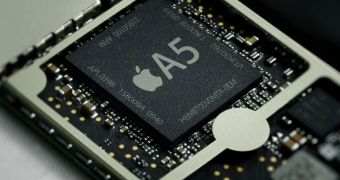A comment made by Greg Welch, director of Intel's Ultrabook group, at the end of a Q&A session on Intel's Ultrabook slim notebook initiative, reveals that Apple may indeed move exclusively to its own A-series of chips, if only just for the portable line of Macintosh computers.
Rumors abound regarding a potential switch from Intel hardware to the custom-made A-series of chips currently used in iPhones, iPads, and the iPod touch players.
Apple first introduced an A-series SoC (system on a chip) with the iPhone 4.
The A4 was the brainchild of several Apple acquisitions, two of which are known to be Intrinsity and P.A. Semi.
Apple used the duo’s expertise to conceive the silicon, then contracted Korea-based Samsung Electronics to handle the assembly.
Since then, an A5 was spawned. It currently powers the iPad 2 (and will soon leverage iOS 5 and iCloud inside the iPhone 5) with double the processing power, and nine-times better graphics output, according to the technical specifications dished out by Apple.
So, it is no mystery that the Cupertino, California-based mammoth is considering to equip not only future iOS devices with the already-confirmed A6, but also its MacBook computers.
The A6 would undoubtedly give Apple more control over refresh cycles, software optimizations, battery life etc., and the way some people see it, it’s only a matter of time before it happens.
As such, Intel is taking no chances in having Apple lose interest in its offerings.
"We hear the same rumors and it would be remiss of us to be dismissive," said Greg Welch, Intel’s director of the Ultrabook group. "We endeavor to innovate so they'll continue to look to us as a supplier."
Apple, for its part, is not wasting any time in seeing how far Taiwan Semiconductor Manufacturing Co., Ltd. (TSMC) can push the A6.
TSMC, the world’s largest semiconductor foundry by market shares, has reportedly started trial production of the upcoming A6 processor “in cooperation with Apple Inc.”

 14 DAY TRIAL //
14 DAY TRIAL //